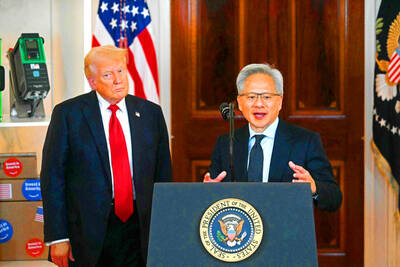BenQ Corp (明基), Taiwan's top mobile phone maker, yesterday posted a record high quarterly loss as it failed to turn around the unprofitable mobile phone unit it took over from Siemens AG less than a year ago.
BenQ, however, said the worst period was behind it.
"We now are fixing some of the remaining problems. We hope the company will soon be on the road towards healthy growth," chairman Lee Kun-yao (李焜耀) told investors with relief.
Lee admitted that the plan to push the Taiwanese brand onto the global stage via the merger with Siemens' handset unit had been "unsuccessful."
Losses widened to NT$12.22 billion (US$369 million), or NT$4.65 per share, in the third quarter, bringing the total loss in the first nine months to NT$19.7 billion. This was compared to a net income of NT$20 million, or NT$0.01 per share, in the third quarter of last year.
Late last month, BenQ decided to stop funding BenQ Mobile, its money-losing European subsidiary, and put the Munich-based company into receivership because of a run of losses that began with the takeover last October.
"We believe it will now be easier for us to hit our goal of turning things around in 2007 as operational expenses will be reduced by 90 percent after excluding BenQ Mobile," BenQ president Sheaffer Lee (李錫華) said.
BenQ remains strong in liquid-crystal-display (LCD) monitors, projectors and printers, which were making profits, he added.
BenQ would continue to sell branded mobile phones, but it would shift its focus to the high-margin niche market, rather than the highly competitive mass market, Lee said without providing any clear brand strategies.
Despite the expected significant improvement in expenses and costs, "it will not be easy for BenQ to turn things around," JP Morgan analyst Kevin Chang (張凱偉) said.
"BenQ's operations have just returned where they were one or two years ago, but the competition is much stiffer now as more players have joined the battle," Chang said.
He said he would retain his "sell" rating on BenQ with a target price at NT$6.5.
Excluding sales, BenQ Mobile revenues dropped over 26 percent to NT$40.67 billion in the quarter ending last month from NT$54.85 billion in the second quarter.
"Overall revenue will slide slightly further in the fourth quarter," BenQ's president Lee said.
BenQ's mobile phone business made up 18 percent of the company's total revenue last quarter, down from 36 percent in the previous quarter. LCD monitors, among other computing products, made up around 70 percent of the third-quarter revenue.
Separately, BenQ also said it planned to raise NT$10 billion to reduce debts, which totaled NT$4 billion as of last quarter, over the next four quarters by selling long-term investments and fixed assets worth a combined NT$70 billion.
Shares of BenQ rose 0.58 percent to NT$17.25 on the Taiwan Stock Exchange yesterday, underperforming against the benchmark TAIEX index's 0.81-percent gain.

Taiwan Semiconductor Manufacturing Co (TSMC, 台積電) last week recorded an increase in the number of shareholders to the highest in almost eight months, despite its share price falling 3.38 percent from the previous week, Taiwan Stock Exchange data released on Saturday showed. As of Friday, TSMC had 1.88 million shareholders, the most since the week of April 25 and an increase of 31,870 from the previous week, the data showed. The number of shareholders jumped despite a drop of NT$50 (US$1.59), or 3.38 percent, in TSMC’s share price from a week earlier to NT$1,430, as investors took profits from their earlier gains

AI TALENT: No financial details were released about the deal, in which top Groq executives, including its CEO, would join Nvidia to help advance the technology Nvidia Corp has agreed to a licensing deal with artificial intelligence (AI) start-up Groq, furthering its investments in companies connected to the AI boom and gaining the right to add a new type of technology to its products. The world’s largest publicly traded company has paid for the right to use Groq’s technology and is to integrate its chip design into future products. Some of the start-up’s executives are leaving to join Nvidia to help with that effort, the companies said. Groq would continue as an independent company with a new chief executive, it said on Wednesday in a post on its Web

CHINA RIVAL: The chips are positioned to compete with Nvidia’s Hopper and Blackwell products and would enable clusters connecting more than 100,000 chips Moore Threads Technology Co (摩爾線程) introduced a new generation of chips aimed at reducing artificial intelligence (AI) developers’ dependence on Nvidia Corp’s hardware, just weeks after pulling off one of the most successful Chinese initial public offerings (IPOs) in years. “These products will significantly enhance world-class computing speed and capabilities that all developers aspire to,” Moore Threads CEO Zhang Jianzhong (張建中), a former Nvidia executive, said on Saturday at a company event in Beijing. “We hope they can meet the needs of more developers in China so that you no longer need to wait for advanced foreign products.” Chinese chipmakers are in

POLICY REVERSAL: The decision to allow sales of Nvidia’s H200 chips to China came after years of tightening controls and has drawn objections among some Republicans US House Republicans are calling for arms-sale-style congressional oversight of artificial intelligence (AI) chip exports as US President Donald Trump’s administration moves to approve licenses for Nvidia Corp to ship its H200 processor to China. US Representative Brian Mast, the Republican chairman of the US House Committee on Foreign Affairs, which oversees export controls, on Friday introduced a bill dubbed the AI Overwatch Act that would require the US Congress to be notified of AI chips sales to adversaries. Any processors equal to or higher in capabilities than Nvidia’s H20 would be subject to oversight, the draft bill says. Lawmakers would have